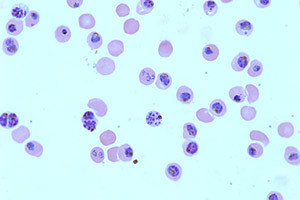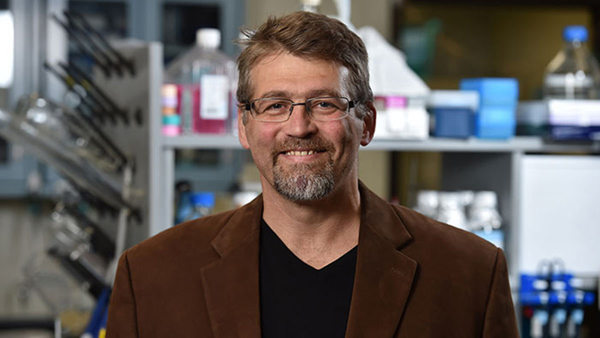Notre Dame Leads $11.5 Million Study to Solve Problem of Drug Resistant Malaria
The University of Notre Dame will lead an $11.5 million project funded by the National Institutes of Health (NIH) to better understand the genes responsible for drug resistance and virulence in the malaria parasite in order to reduce and ultimately eliminate the deadly disease.
Notre Dame is partnering with researchers at the Center for Infectious Disease Research (CIDR) in Seattle and the Texas Biomedical Research Institute (TBRI) on the project.
 Malaria parasite P. falciparum
Malaria parasite P. falciparum
The team will use an innovative approach, conducting experimental genetic crosses, to study the single-celled malaria parasite P. falciparum. A genetic cross is the offspring that comes from breeding two different “parents” — in this case one parasite known for drug resistance and one known for drug sensitivity. The resulting offspring, individual siblings, inherit unique combinations of genes from each parent parasite, allowing researchers to identify the genes causing the drug resistance. This information can lead them to devise better methods to combat the parasite.
The World Health Organization has recognized malaria as a major global health threat that disproportionately affects low-income countries. Malaria is preventable and curable, and the widespread use of the drug artemisinin (ART) has been a key factor in significant reductions in infections and death, but a recent rise in resistance to ART in Southeast Asia poses an imminent risk to ongoing global efforts to combat the disease.“This will allow us to speed the rate of discovery using genetic crosses by tenfold,” said Michael Ferdig, who is leading the study. Ferdig is a biologist and professor in the Department of Biological Sciences at Notre Dame and the Eck Institute for Global Health. “We’ve generated more genetic crosses in the past three years than were generated in the 30 years prior. We will now have time to see drug resistance emerging so that we can devise ways to stop it in its tracks.”

Until now, the ability to harness the power of P. falciparum genetics has been eclipsed by challenges — costs, technical difficulty, ethics — of generating experimental crosses. The Notre Dame collaboration utilizes a “humanized” mouse strain — work pioneered by the research group at CIDR to genetically engineer a mouse with a liver consisting of more than 90 percent human cells — for rapid and routine generation of large numbers of parasite progeny.
For the first time, it will be possible to generate crosses rapidly from emerging malaria outbreaks.
The ultimate goal of this research program is to share open source data with the broader malaria research community to enhance understanding of the genetic mechanisms of drug resistance and virulence.
This Award is being issued by the NIH’s National institute of Allergy and Infectious Diseases under grant number: 1P01AI127338-01A1.
Contact: Jessica Sieff, assistant director, media relations, 574-631-3933, jsieff@nd.edu
Originally published by at news.nd.edu on September 20, 2017.